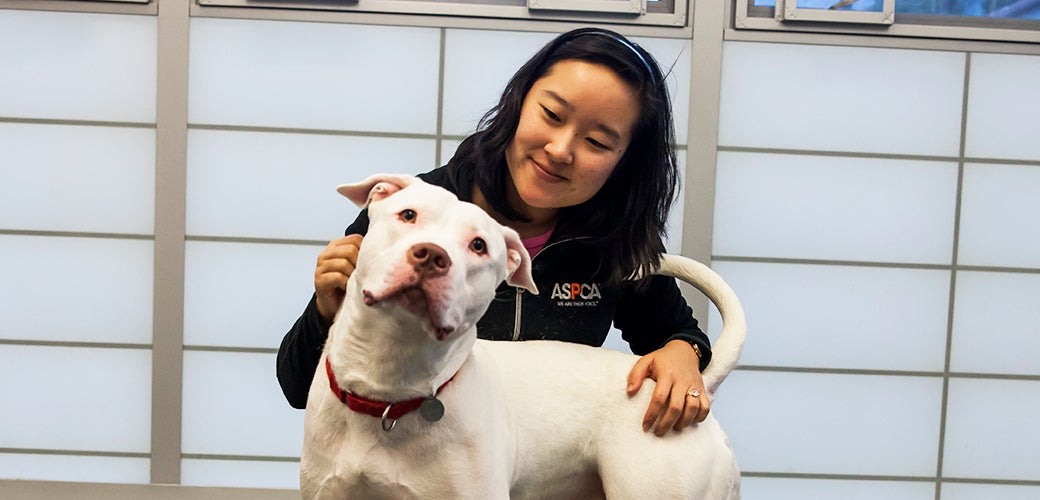Why veterinary behaviour matters more than standard commands
Understanding the Duty of a Veterinary Behaviourist in Animal Training and Health
The role of a veterinary behaviourist is important in attending to the detailed relationship between pet dogs and their proprietors. They incorporate veterinary medicine with insights from animal habits scientific research to take on issues like hostility and anxiousness. Unlike typical trainers, their approach concentrates on the underlying root causes of these actions. This nuanced viewpoint elevates concerns regarding the performance of conventional training techniques and just how a much deeper understanding can change pet wellness. What strategies do they use to attain these outcomes?
What Is a Vet Behaviourist?
A vet behaviourist is a specialized expert that focuses on understanding and dealing with the behavioral concerns of animals, particularly pets. Their knowledge incorporates veterinary medicine and pet behavior science, enabling them to detect and treat a vast variety of behavior issues - veterinary behaviour. These experts often hold sophisticated levels, such as a Master's or PhD in pet behavior, and are certified by appropriate organizations, ensuring they possess a deep understanding of animal psychology
Veterinary behaviourists assess animals through in-depth monitoring and analysis, thinking about aspects such as genes, atmosphere, and training history. They establish tailored therapy plans, which may include desensitization strategies, favorable support approaches, and ecological modifications. Partnership with family pet owners is vital, as they offer assistance and support throughout the training process. Inevitably, the objective of a veterinary behaviourist is to enhance the well-being of the pet while cultivating a harmonious relationship in between pet dogs and their proprietors.
The Significance of Understanding Pet Actions
Comprehending animal actions is necessary for both family pet owners and specialists in the area of animal treatment, as it lays the foundation for effective interaction and training. Acknowledging how pets perceive their setting and respond to stimuli allows caretakers to create an extra harmonious living circumstance. Insight into behavioral signs, such as body movement and vocalizations, cultivates more powerful bonds in between pet dogs and their owners. By appreciating the natural reactions and requirements of different types, individuals can tailor their training approaches to suit these aspects, advertising much better learning and participation. Additionally, a strong understanding of behavioral scientific research help in determining stress factors and potential triggers, enabling aggressive interventions. Generally, understanding animal habits not just enhances the wellness of pet dogs but likewise enhances the experiences of those that care for them, ultimately causing much healthier, happier relationships.
Typical Behavioral Issues Resolved by Vet Behaviourists
Vet behaviourists frequently deal with typical behavior concerns in pets, including aggression and worry actions. They additionally concentrate on anxiousness and stress and anxiety management, which can significantly affect an animal's wellness. Comprehending these problems is necessary for creating reliable training and treatment methods.
Aggression and Fear Reactions
While numerous family pet owners may see aggression and fear responses as simple behavior concerns, these complicated reactions typically come from underlying anxiety or past injury. Vet behaviourists play a necessary function in identifying the origin of these habits, which can materialize in various kinds, consisting of growling, biting, or excessive anxiety of specific situations. Understanding these triggers is essential for establishing effective training strategies customized to every pet's one-of-a-kind scenarios. Behaviourists employ approaches such as desensitization and counter-conditioning to assist pets handle their worries and aggressiveness. Furthermore, they educate family pet owners regarding appropriate monitoring techniques, stressing the significance of perseverance and consistency. Resolving hostility and anxiety actions not just improves the pet dog's top quality of life however likewise enhances the bond between animal and proprietor.
Anxiety and Stress Administration
Anxiousness and stress are prevalent concerns that many family pets encounter, commonly resulting from modifications in their setting, absence of socialization, or previous unfavorable experiences. Vet behaviourists play an important function in recognizing the underlying reasons for these issues. They utilize different strategies, consisting of behavioral modification, desensitization, and counter-conditioning, to assist family pets take care of anxiety. Furthermore, they may suggest ecological adjustments, such as developing secure spaces or offering enrichment activities that promote relaxation. Partnership with family pet proprietors is essential, as behaviourists guide them in understanding their animal's signals and executing efficient coping methods. By resolving anxiousness and stress, veterinary behaviourists add greatly to improving the overall wellness and lifestyle for pets and their families.
How Veterinary Behaviourists Differ From Standard Trainers
Vet behaviourists vary from traditional instructors primarily in their educational backgrounds and training. While traditional fitness instructors often concentrate on obedience and standard commands, veterinary behaviourists highlight understanding and addressing underlying behavior concerns, incorporating clinical considerations right into their strategy. This unique focus permits them to supply a more comprehensive therapy for family pets with complicated behavior difficulties.
Education and Training Distinctions
Comprehending the difference between vet behaviourists and standard trainers is crucial for family pet proprietors looking for effective training options. Vet behaviourists possess postgraduate degrees in vet medicine, usually complied with by specialized training in pet behavior. This education and learning equips them to resolve complex behavioral concerns that may originate from medical conditions or emotional factors. On the other hand, typical fitness instructors typically have accreditations from training programs that concentrate on obedience and basic commands without delving right into the underlying psychological or clinical aspects. While both experts intend to improve animal behavior, vet behaviourists can diagnose and treat behavioral problems holistically, incorporating clinical expertise into training approaches. This vital difference highlights the value of picking the appropriate professional look at here based on the animal's specific needs.
Focus on Behavioral Issues
Dealing with behavioural official website problems calls for a nuanced strategy that identifies vet behaviourists from typical trainers. While traditional trainers often focus on obedience and basic commands, vet behaviourists discover much deeper right into the underlying causes of troublesome behaviors. They employ a comprehensive understanding of animal psychology and therapy strategies, which are rooted in clinical research study. This know-how enables them to identify issues originating from anxiousness, concern, or hostility, as opposed to merely addressing surface-level signs and symptoms. On top of that, veterinary behaviourists assess the animal's overall health, taking into consideration ecological elements and the pet's background. By integrating clinical expertise with behavioral techniques, they provide customized options that promote long-term behavioral modification, guaranteeing both the animal's and proprietor's lifestyle are noticeably enhanced.
Medical Factors To Consider Included
While typical fitness instructors might ignore hidden medical concerns, veterinary behaviourists focus on a comprehensive analysis of a pet's wellness as a foundational action in dealing with behavioral troubles. This strategy allows them to determine potential medical problems that might contribute to unwanted behaviours, such as anxiousness, pain, or neurological problems. By integrating medical analyses into their technique, veterinary behaviourists can collaborate with vets to assure a holistic understanding of the family pet's well-being. Furthermore, they can advise appropriate treatments or modifications to training strategies based upon clinical searchings for. This extensive point of view differentiates vet behaviourists from typical instructors, as they address both behavioural and health-related elements, eventually bring about more effective and sustainable outcomes for animals and their owners.

The Refine of Functioning With a Veterinary Behaviourist
Teaming up with a veterinary behaviourist entails a methodical approach to addressing a pet dog's behavior issues. Initially, the procedure begins with a comprehensive analysis, where the behaviourist collects thorough information about the family pet's history, setting, and certain habits that are troublesome. This generally includes sets of questions, meetings with the pet owner, and often monitorings of the pet in its atmosphere.
Complying with the analysis, the vet behaviourist creates a customized treatment strategy that might consist of behavior modification techniques, training strategies, and, if required, suggestions for medical examinations. board certified veterinary behaviourist. The plan is developed to be useful and attainable, making sure that it fits flawlessly right into the family pet proprietor's way of life
Succeeding follow-up sessions are important to check progression, change strategies, and offer support. This joint effort not just aims to change unwanted behaviors yet also to boost the general well-being of the family pet, guaranteeing an unified connection between the pet dog and its owner.
Enhancing Your Family pet's Top quality of Life Via Behavioral Support
Enhancing a pet dog's lifestyle via behavioral assistance is important for cultivating a healthy and meeting relationship between pet dogs and their proprietors (veterinary behaviour). Vet behaviourists play a crucial duty in identifying and attending to behavior issues that may impede a click now pet dog's well-being. Through customized approaches, they help minimize stress and anxiety, anxiety, and aggression, ultimately promoting a much more well balanced and satisfied pet
Behavioral support includes different methods, consisting of favorable support, ecological enrichment, and socializing. By implementing these strategies, owners can create a nurturing environment that motivates positive habits. This not only improves the animal's emotional health and wellness however likewise enhances the bond between pet and owner.
Additionally, regular consultations with a veterinary behaviourist guarantee that any arising behavior problems are without delay resolved, protecting against rise. On the whole, purchasing behavioral support is a positive method that significantly enriches a pet's life, leading to enhanced physical and mental wellness end results.
Often Asked Questions
What Certifications Do Veterinary Behaviourists Have?
Vet behaviourists normally hold a veterinary level, followed by specialized training in animal behavior. Several likewise have accreditations from recognized companies, demonstrating their competence in addressing pet behavior concerns and promoting total animal health.
Can Veterinary Behaviourists Suggest Medication for Pet Dogs?


Veterinary behaviourists, possessing veterinary levels and specialized training, can without a doubt suggest drug for pet dogs. This ability enables them to deal with underlying behavioral issues effectively, often combining medicinal therapy with behavioral modification strategies for ideal end results.
For How Long Does Behavior Modification Generally Take?
Behavioral treatment duration differs substantially, normally ranging from a couple of weeks to a number of months. Elements affecting this timeline consist of the animal's details problems, consistency of training, and the proprietor's interaction at the same time.
Are Remote Appointments Offered With Vet Behaviourists?

Just how much Does a Veterinary Behaviourist Appointment Price?
The price of a vet behaviourist appointment typically varies from $100 to $300, relying on variables such as area, experience, and session size. Extra fees may make an application for follow-up appointments or specialized solutions.